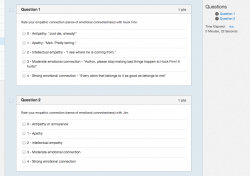
This semester, I taught a Banned Books class focusing on the ways that authors deploy empathy. One cornerstone of the class was a series of daily surveys. Each discussion was preceded by a survey (pictured above) in which students gave an informal ranking of their empathetic response to the main character(s) featured in the day’s readings. My goal was to help students theorize their own responses to stories, but I also ended up generating some unexpected revelations.




